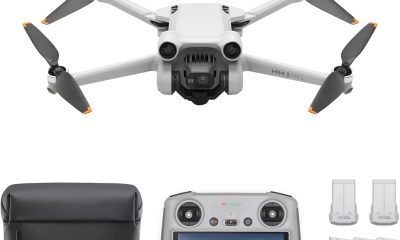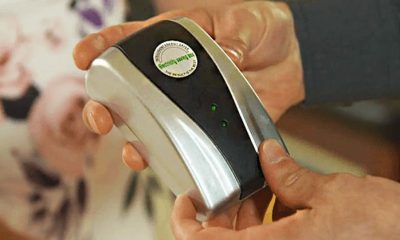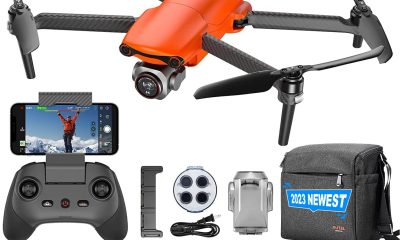Health
Fitness Gaming: Enjoyable Exertion and Exercise with Technology

In this rapid evolution of fitness, technology has become absolutely indispensable. Probably the coolest technology to arise from this is fitness gaming. The concept of fitness gaming, otherwise called “exergaming,” is to deal with fun and interactive methods of staying fit and active by taking engaging video game-playing experiences and making the activity in itself some form of physical movement.
Whether a gamer at heart or someone merely looking for ways to make exercise a more fun activity, fitness gaming is a new way to achieve health and well-being.
What is Fitness Gaming?
Fitness gaming is a form of gaming using video games that require activity to play them and include, but are not limited to, motion sensors, virtual reality, and wearables. Running parallel to the successes of “Wii Fit” and “Just Dance” has been the stellar growth of virtual reality platforms like Oculus Quest, PlayStation VR, and specialized workout apps designed to integrate with either video game platforms or mobile phones.
Apart from the normal exercises, which may be mundane and hence uninteresting, it is fun because the fitness games help gamers achieve their fitness goals.
How Fitness Gaming Works
Fitness gaming could involve several sorts of motion-tracking technologies that may be combined to provide real-time feedback. It involves motion sensing via something like XBOX Kinect or Joy-Con controllers of the Nintendo Switch that lets users both move in reaction to what is happening on screen. Virtual Reality-based games throw the user into a virtual world; one dodges obstacles, punches, or choreographs some dance while immersed in some entertaining storyline.
Most of these games are oriented toward improvement in various parts of physical health, including cardio, strength, flexibility, and coordination. A very good example involves rhythm-based games, such as “Beat Saber,” where users have to make fast hand movements through target slashes, thus fully working the arms, core, and legs. Similarly, boxing games like “Thrill of the Fight” give extremely excessive cardio sessions while teaching reflexes and hand-to-eye coordination.
Fitness Gaming: Shaping the Future
- Motivation through Gaming: Fitness gaming is hugely motivational—in fact, one of the key benefits—to a player. In cases where exercises are transformed into some sort of game, it helps keep him or her both involved and challenged. Competition, scoring, progress tracking allow the player to stay motivated toward their goals without the tensions of going to the gym.
- Accessible to All Fitness Levels: Fitness games really can work for anyone, from the total beginner up to the well-seasoned athlete. Most of these games have different difficulty levels; therefore, the player can easily adjust the difficulty, intensity, and length or duration of a workout according to one’s level of fitness.
- Full-body workout: Most of the fit games incorporate a range of motion that includes large muscle groups. Games involving jumping, squatting, stretching, and running raise a workout for the whole body to effect cardiovascular benefits, building muscle strength, and coordination. In this way, one gets to have a very good sweat without having a feeling that he/she is really doing a “workout”.
- Social Advantage: Another major plus could be a social advantage. Most of these fitness games boast multi-player functions, whereby friends or family members can work out with one another—even in the case of long-distance separations. These virtual leaderboards, online challenges, and co-op mode create a community atmosphere wherein people support and challenge each other in fun ways.
Fitness Gaming: The Future of Workouts
Technology will continue improving, and it is just about time for fitness gaming to go mainstream. Innovations in wearables, motion sensors, and even head-worn virtual reality gadgets will ensure fitness games become more immersive and physically challenging. From interactive workout apps that can measure heart rates to games that can emulate natural sports, the experiences will appeal to different kinds of people.
Fitness gaming lets many people who can’t find the time or motivation otherwise make physical exercise a form of fun and competition. Because it marries two largely separate worlds—the excitement of gaming and the health benefit of exercise—it opens the door to a very accessible, enjoyable, and sustainable form of fitness. Exergaming literally is a game-changer in the world of fitness.
Health
Telemedicine Gadgets Depict the Future of Remote Health Care

What used to be an ancillary service suddenly became mainstream in healthcare, especially after the COVID-19 outbreak. Patients and care providers found safer and more convenient means of substituting for personal visits. Telemedicine literally became the best option. Not only are more people warming up to the idea of remote health, but innovative telemedicine-related gadgets are redefining what medical care from home will look and feel like in the near future.
The Emergence of Telemedicine Devices
With increased demand for remote healthcare, specially adapted telemedicine devices will change the way patients communicate with practitioners. The ability of such tools to bridge the gap between virtual and in-person consultations rests in their promotion of better data collection and accuracy in diagnoses.
Wearable health monitors are no longer just about counting steps and detecting heart rates but have also taken the form of smartwatches and fitness trackers. Many come armed with sensors to measure blood oxygen saturation, irregular heartbeat, or even sleep patterns. This enables physicians to make real-time inferences about their patients’ health states and makes it easy to manage chronic diseases such as diabetes, hypertension, and heart disease remotely.
Best Telemedicine Devices
- Remote Monitoring Devices: Blood pressure monitors, glucometers, and pulse oximeters have become staples in remote healthcare. Patients can use these devices to check their vital statistics from home, with the data being sent instantly to their healthcare provider. A real-time dashboard can alert a doctor if the reading of a patient is outside the normal range, ensuring prompt treatment.
- Smart Stethoscopes: These are set to be a game-changer for remote consultations. Smart stethoscopes can digitize heart and lung sounds, allowing physicians to check heartbeats, breathing patterns, and other critical sounds through virtual consultations. Devices like Eko Core demonstrate how precise diagnostic tools can be integrated into telehealth for accurate at-home assessments.
- Telemedicine Kiosks: Though not home devices, telemedicine kiosks are emerging in pharmacies and clinics. Equipped with everything from thermometers to blood pressure cuffs and other critical medical devices, patients can now conduct tests on their own while being remotely guided by a healthcare provider. This reduces wait times and eliminates unnecessary hospital visits.
- Portable Ultrasound Devices: Portable ultrasound devices, such as Butterfly iQ, have allowed healthcare providers to study ultrasounds remotely. These devices help diagnose and monitor conditions related to pregnancy, organs, and more. Portable ultrasound machines are especially valuable in underserved or geographically remote communities, bridging gaps in healthcare.
Artificial intelligence (AI) applications are also extending to advanced gadget use, monitoring symptoms, showcasing personalized health tips, and even suggesting professional care when necessary. These applications analyze data from wearables or home monitoring devices and provide insights or recommendations based on the user’s health patterns.
The Benefits and Challenges
Telemedicine devices make healthcare more accessible, especially for people in rural areas or with mobility issues. They provide a safe and convenient way to monitor health without sacrificing quality care. These devices also help healthcare providers support more patients efficiently and reduce pressure on medical resources.
However, there are challenges to overcome: the devices need to be user-friendly, affordable, and accessible to all populations. Connectivity, data security, and accuracy assurance are additional hurdles that must be addressed as the technology gains momentum.
The Future of Telemedicine Devices
As technology improves, the capabilities of telemedicine gadgets will expand. Future advancements may include AI diagnostics, integrations into electronic health records, and virtual reality for remote physical therapy or surgical consultations. Telemedicine, once considered an adjunct to traditional care, has now become a crucial part of modern healthcare.
At the core of this transformation are telemedicine gadgets, helping both patients and providers navigate healthcare in a more timely, effective, and efficient manner. As these devices continue to evolve, they will guide healthcare into a future that is remote, smart, and accessible.
Health
Best Apps for Mental Well-being: From Meditation to Therapy

In today’s fast-paced world, many people are prioritizing mental health as a key aspect of maintaining balance and overall wellness. Thanks to advancements in technology, individuals now have access to mental health resources through a variety of apps designed to support them in managing stress, anxiety, depression, and overall mental well-being. These apps offer a range of features, from meditation techniques to virtual therapy sessions, catering to diverse needs and preferences, making mental health care more user-friendly and adaptable.
1. Calm: Meditation and Mindfulness Practices
Calm stands out as one of the most sought-after apps for meditation and mindfulness practices. It provides guided meditation sessions that address various life aspects, such as stress management, sleep improvement, focus enhancement, and personal development. The app is designed with user convenience in mind, offering exercises that can be completed in as little as three minutes, making it easy to integrate into any busy schedule. Additionally, Calm includes mindfulness activities for children, making it an excellent choice for families seeking ways to incorporate well-being practices into their everyday lives.
Top Features:
- Various meditation sessions available
- Relaxing sleep sounds and sleepcasts
- Exercise routines for movement and stretching
- SOS support sessions during high-stress moments
2. Headspace: Structured Mindfulness Practice
Headspace is popular among both beginners and experienced meditators due to its user-friendly design and diverse meditation offerings. The structured approach of the app helps users establish a consistent mindfulness practice, leading to enhanced clarity and emotional balance.
3. BetterHelp: Convenient Online Therapy
BetterHelp is an online therapy platform that connects individuals with licensed therapists through a convenient app. It allows for flexible therapy sessions where users can interact with their therapist via text chat, phone calls, or video calls. The services provided cover a spectrum of mental health concerns, such as anxiety, depression, relationships, and self-esteem.
Highlighted Features:
- Access to licensed therapists
- Multiple communication options
- Flexible scheduling
- Journal feature for tracking progress
One of the main advantages of BetterHelp is the opportunity to receive professional help from the comfort of one’s own home, making therapy more accessible to those who may struggle with attending face-to-face appointments. The app’s diverse communication tools enable users to seek support in a manner that aligns best with their needs.
4. Talkspace: Versatile Therapy Options
Talkspace is another online therapy app that connects users with therapists and offers multiple communication avenues such as text messages, video calls, and audio messages. Similar to BetterHelp, Talkspace focuses on addressing issues like depression, anxiety, substance abuse, and relationship challenges. This platform proves beneficial for individuals seeking therapy but facing constraints in terms of time or resources for in-person sessions.
Features:
- Connect with licensed therapists with specialized knowledge
- Unlimited messaging therapy available
- Therapy sessions offered through video, audio, or text
- Some users may have insurance coverage
Additionally, Talkspace provides psychiatry services for those needing mental health medications along with therapy. This makes it a comprehensive solution for both counseling and medication management.
5. Sanvello: Anxiety and Depression Relief
Sanvello aims to assist users in handling stress, anxiety, and depression by using cognitive behavioral therapy (CBT) techniques, mood tracking, and mindfulness practices. The app provides guided journeys focusing on mental health objectives like boosting confidence, reducing anxiety, or coping with stress. Users can also access community support to connect with others facing similar struggles.
Key Features:
- Guided journeys based on CBT principles
- Daily mood tracking and journaling options
- Meditation and relaxation techniques
- Peer support community for interaction
Sanvello’s evidence-based approach makes it a solid option for those looking for a scientifically proven way to enhance their mental well-being. The mood tracking feature helps users better understand their patterns and triggers.
6. Moodfit: Mental Health Fitness
Moodfit is a mental health app that equips users with tools to manage their emotions and overall well-being. The app features mood monitoring, mindfulness activities, cognitive behavioral therapy tools, and a gratitude journal. Additionally, Moodfit offers educational materials on mental health topics and personalized insights based on user information.
Notable Features:
- Personalizable mental health resources
- Tracking moods and thoughts
- Gratitude diary
- Breathing techniques
Moodfit’s range of tools makes it a versatile choice for those seeking to enhance their well-being through introspection and daily routines. The app’s capacity to customize its services according to individual requirements is a significant benefit for users aiming for a tailored mental health regimen.
Given the growing recognition of mental well-being’s significance, such applications provide essential support in dealing with stress, anxiety, depression, and overall wellness. Whether you wish to kickstart meditation practices, address sleep issues, or connect with a counselor, there’s an app designed specifically for your needs. By incorporating these resources into your routine, you can take proactive measures toward sustaining and enhancing your mental health.
Health
The Impact of Artificial Intelligence on Personalized Health and Wellbeing

Artificial Intelligence (AI) is swiftly reshaping the field of health and wellbeing, offering opportunities for customized care. By incorporating AI into healthcare, we are witnessing the emergence of tailored, efficient, and proactive approaches to managing health needs. This integration holds promise, from boosting precision to crafting personalized treatment strategies and lifestyle suggestions.
Improving Diagnostic Precision and Timely Detection
A key advantage of AI in healthcare lies in its capacity to enhance diagnostic accuracy. Traditional diagnostic techniques heavily rely on human skills, which can at times be constrained by time limitations, subjective interpretations, and access to data. AI systems powered by machine learning and deep learning algorithms excel at analyzing vast datasets and can do so more accurately compared to humans. These systems can pinpoint patterns and connections in information that may elude even the most seasoned professionals.
For example, AI has demonstrated significant potential in detecting diseases like cancer. Through advanced algorithms, AI can examine images such as mammograms or MRIs to spot early signs of tumors with remarkable precision. Detecting these conditions sooner can greatly enhance treatment outcomes by enabling timely intervention. Additionally, AI-powered diagnostic tools have the capability to continuously learn and improve their accuracy and reliability over time.
Tailored Treatment Plans
The field of treatment planning is being transformed by AI as well. Traditional approaches often rely on a one-size-fits-all model, which may not be ideal for every individual. AI allows for a more personalized approach by analyzing specific patient data, such as genetic information, lifestyle factors, and medical history, to recommend treatments customized to each patient’s unique requirements.
For instance, AI can aid in designing personalized medication plans by predicting how patients might react to various drugs. This is especially valuable in areas like oncology, where the effectiveness of cancer treatments can differ significantly among patients. By leveraging AI to examine genetic data and other pertinent factors, healthcare professionals can devise treatment strategies that are more likely to be successful for each patient, reducing the chances of adverse effects and enhancing overall outcomes.
Recommendations for Lifestyle and Wellbeing
In addition to diagnostics and treatment options, AI is playing a growing role in promoting health and wellness through personalized lifestyle suggestions. Wearable devices like smartwatches and fitness trackers are increasingly integrating AI technology to offer users tailored advice on diet, exercise routines, sleep patterns, and stress management. These gadgets gather information on health indicators like heart rate, activity levels, and sleep quality, which AI systems analyze to provide insights and suggestions.
For example, a fitness tracker powered by AI might recommend a workout plan based on a user’s activity history, fitness goals, and physical condition. Similarly, AI-driven nutritional apps can assess a user’s eating habits and propose meal plans tailored to their health objectives, such as weight management, muscle building, or controlling conditions like diabetes.
AI also plays a role in helping individuals handle stress and mental well-being by studying behavior patterns and physiological responses. Certain AI-driven apps can track speech patterns, facial expressions, or typing behaviors to detect signals of stress, anxiety, or depression in users. These apps can then provide customized coping strategies like mindfulness exercises, breathing techniques, or advice to seek professional support if necessary.
Proactive Health Management
Another significant benefit of AI in healthcare is its capacity to support proactive health management. By continuously monitoring an individual’s health data, AI can identify potential health issues before they escalate into major concerns. Taking a proactive approach empowers individuals to make informed decisions about their well-being and adopt preventive measures to avoid illnesses or better manage existing health conditions.
For example, AI-powered predictive analytics can help identify individuals who are at risk of developing chronic conditions like heart disease or diabetes based on their lifestyle choices and health data. Healthcare professionals can then work with these individuals to implement preventive strategies, such as lifestyle modifications or early interventions, to reduce their risks.
Furthermore, AI can aid in the management of chronic conditions by supporting patients in adhering to treatment plans and monitoring their health status. AI-driven apps can send reminders for medication intake, track symptoms, and offer real-time feedback on progress. This continuous support can help patients effectively manage their conditions and improve their overall well-being.
Considering Ethical Concerns and Hurdles
While the potential advantages of AI in personalized healthcare are vast, it’s crucial to address ethical concerns and challenges. Privacy issues take center stage since utilizing AI involves gathering and analyzing personal health data. Safeguarding this data securely and using it responsibly is essential for maintaining trust.
Additionally, there is a concern about bias in AI algorithms, which can lead to discrepancies in healthcare outcomes. The effectiveness of AI systems depends greatly on the quality of the data they are trained on. If this data is biased or not fully representative, the recommendations provided by AI may be skewed. This could result in certain groups receiving inadequate care, thereby worsening existing health inequalities.
The use of AI in health and well-being is progressing rapidly, presenting opportunities for more tailored, efficient, and proactive healthcare services. Whether it’s improving diagnostic precision, creating customized treatment strategies, suggesting personalized lifestyle adjustments, or supporting proactive health maintenance, AI has the potential to significantly enhance personal health outcomes. However, it is crucial to address the ethical issues and challenges associated with AI to ensure that its benefits are realized fairly and responsibly. As AI technology continues to advance, it will undoubtedly play a central role in shaping the future of personalized health and well-being.
Trending

 Drones2 years ago
Drones2 years agoRuko-F11GIM-Drones-Camera-Batteries

 Drones2 years ago
Drones2 years agoDJI’s tiny drone

 Home2 years ago
Home2 years agoElectroSave Review

 Drones2 years ago
Drones2 years agoAutel Robotics EVO Lite+ Review

 Bug Repellant Gadgets2 years ago
Bug Repellant Gadgets2 years agoSmosquito Review

 Photography & Videography Drones2 years ago
Photography & Videography Drones2 years agoStealth Hawk Pro Drone Review

 Beauty Gadgets2 years ago
Beauty Gadgets2 years agoBright Selfie Review

 Health1 year ago
Health1 year agoTelemedicine Gadgets Depict the Future of Remote Health Care





















